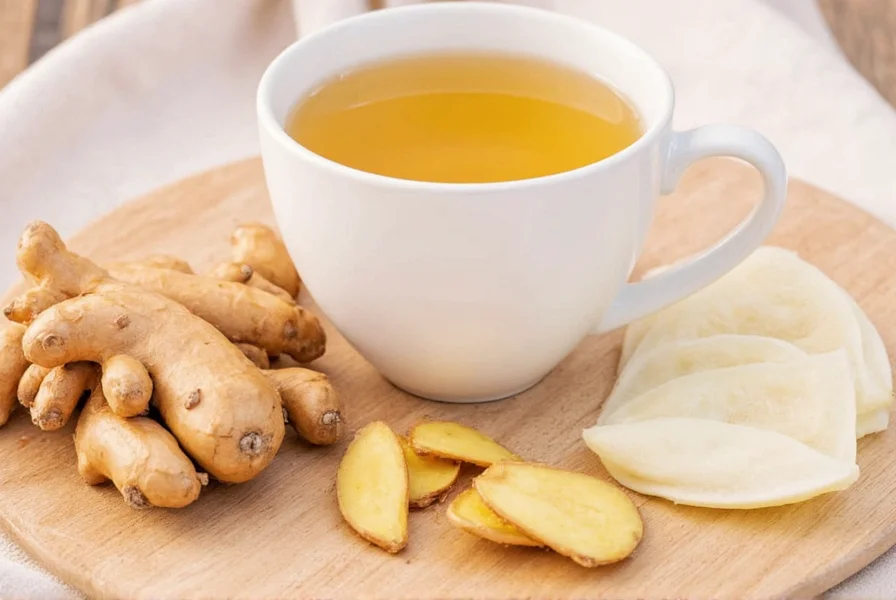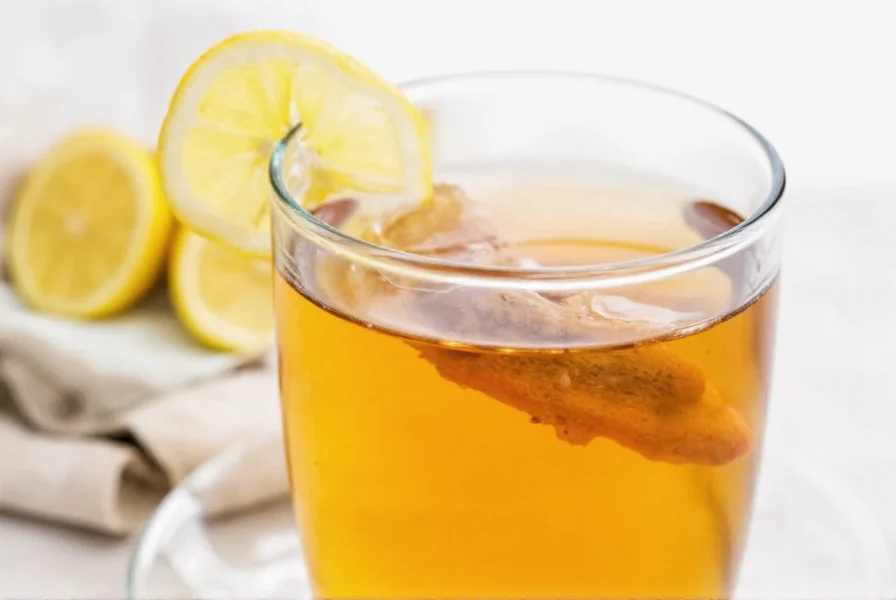When you're battling a cold, many turn to ginger tea as a natural remedy. This centuries-old practice has gained scientific support for its potential to ease discomfort while your body fights the viral infection. Unlike pharmaceutical options, ginger tea offers a gentle approach with minimal side effects for most people.
The Science Behind Ginger and Cold Relief
Ginger (Zingiber officinale) contains bioactive compounds like gingerols and shogaols that demonstrate anti-inflammatory and antioxidant effects. A 2013 study published in the Journal of Ethnopharmacology found that ginger extract inhibited the growth of human respiratory syncytial virus (RSV), a common cold virus. While this laboratory research doesn't prove ginger tea cures colds in humans, it suggests potential mechanisms for symptom relief.
Research indicates ginger may specifically help with:
- Sore throat discomfort through its anti-inflammatory action
- Nausea and digestive upset that sometimes accompanies colds
- Mild congestion relief through warming properties
- Hydration support when consumed as a warm beverage
| Symptom | How Ginger Tea May Help | Scientific Support Level |
|---|---|---|
| Sore throat | Anti-inflammatory properties reduce throat irritation | Moderate |
| Nausea | Ginger's established antiemetic effects | Strong |
| Congestion | Warming effect may temporarily ease breathing | Limited |
| General discomfort | Hydration and warmth provide comfort | Anecdotal |
How to Prepare Effective Ginger Tea for Cold Relief
Not all ginger teas deliver equal benefits. For maximum potential relief when fighting a cold, prepare fresh ginger tea rather than relying solely on commercial tea bags:
- Peel and thinly slice 1-2 inches of fresh ginger root
- Boil slices in 2 cups of water for 10-15 minutes (longer boiling increases potency but also bitterness)
- Strain the liquid into a mug
- Add optional ingredients: lemon (vitamin C boost), honey (soothes throat), or a pinch of turmeric (additional anti-inflammatory)
- Drink while warm, 2-3 times daily during cold symptoms

When Ginger Tea Works Best for Cold Symptoms
Ginger tea provides the most noticeable relief during specific cold stages:
- Early symptoms: When you first notice scratchy throat or mild congestion
- Peak symptoms: For sore throat and nausea relief during the height of your cold
- Recovery phase: To support hydration as you regain strength
Research suggests ginger's anti-nausea properties work particularly well, making it valuable when colds cause digestive upset. The warmth of the tea also provides immediate comfort for sore throats and helps maintain hydration—critical when fighting any viral infection.
Limitations of Ginger Tea for Colds
It's crucial to understand what ginger tea cannot do:
- It doesn't kill cold viruses or shorten cold duration significantly
- It won't reduce fever effectively
- It's not a substitute for medical treatment with severe symptoms
- It doesn't prevent colds when consumed regularly
A 2020 review in Complementary Therapies in Medicine concluded that while ginger shows promise for symptom management, "current evidence doesn't support ginger as a primary treatment for upper respiratory infections." Think of ginger tea as a supportive measure within a comprehensive cold care approach.
Safety Considerations and Who Should Avoid Ginger Tea
Ginger tea is generally safe for most adults, but certain individuals should exercise caution:
- People taking blood thinners (ginger may increase bleeding risk)
- Those with gallstone disease (ginger stimulates bile production)
- Individuals with diabetes (ginger may affect blood sugar levels)
- Pregnant women beyond the first trimester (consult physician)
- Children under 2 years (safety not established)
Most adults can safely consume 3-4 cups of ginger tea daily while experiencing cold symptoms. If you notice heartburn, mouth irritation, or other adverse effects, reduce your intake.
Complementary Remedies That Work Well With Ginger Tea
For comprehensive cold symptom management, combine ginger tea with these evidence-supported approaches:
- Honey and lemon: Add to ginger tea for enhanced sore throat relief
- Steam inhalation: Follow ginger tea with steam to maximize congestion relief
- Adequate rest: Essential for immune system function while using natural remedies
- Hydration: Continue drinking water alongside ginger tea
- Saline nasal irrigation: Complements ginger's congestion relief efforts
This holistic approach addresses multiple cold symptoms simultaneously while supporting your body's natural healing processes.
When to Seek Medical Attention
Natural remedies like ginger tea work best for mild cold symptoms. Contact a healthcare provider if you experience:
- Fever above 101.5°F (38.6°C) lasting more than 3 days
- Symptoms worsening after 7-10 days
- Difficulty breathing or chest pain
- Severe headache or facial pain
- Symptoms suggesting possible bacterial infection
Remember that ginger tea serves as complementary support, not a replacement for professional medical care when needed.
Conclusion: Ginger Tea's Role in Cold Management
Ginger tea offers a time-tested, generally safe option for managing certain cold symptoms. While it won't cure your cold, its anti-inflammatory properties can provide meaningful relief for sore throats and nausea when prepared properly. The ritual of preparing and sipping warm ginger tea also promotes rest and hydration—two critical elements of cold recovery. For best results, incorporate fresh ginger tea into a comprehensive cold care routine that includes adequate rest, proper hydration, and medical care when necessary.
Frequently Asked Questions
Does ginger tea actually help with cold symptoms?
Yes, ginger tea can help alleviate certain cold symptoms including sore throat discomfort and nausea due to its anti-inflammatory properties. Research shows ginger contains compounds that may inhibit some cold viruses in laboratory settings, though it doesn't cure colds or significantly shorten their duration. The warmth of the tea also provides immediate comfort and supports hydration.
How much ginger tea should I drink when I have a cold?
Most adults can safely consume 2-4 cups of ginger tea daily while experiencing cold symptoms. Prepare it by boiling 1-2 inches of fresh ginger root in 2 cups of water for 10-15 minutes. Drink while warm, spacing servings throughout the day. If you experience heartburn or other discomfort, reduce your intake. Children over 2 may have smaller servings (½ to 1 cup daily) but should avoid ginger tea if under 2 years old.
Can ginger tea prevent colds if I drink it regularly?
No, regular consumption of ginger tea does not prevent colds. While ginger has immune-modulating properties, no research shows it prevents viral infections that cause colds. The best prevention methods remain frequent hand washing, avoiding close contact with sick individuals, and maintaining overall health through proper sleep and nutrition. Ginger tea may support general immune function as part of a healthy lifestyle but shouldn't be relied upon as a preventive measure.
Is store-bought ginger tea as effective as homemade for cold relief?
Homemade ginger tea from fresh root generally provides more potent relief than most store-bought tea bags. Commercial ginger teas often contain lower concentrations of active compounds. For maximum benefit during a cold, prepare tea using 1-2 inches of freshly sliced ginger root boiled for 10-15 minutes. If using store-bought tea, look for products listing ginger as the first ingredient and consider adding fresh lemon or extra ginger slices to boost effectiveness.
How quickly does ginger tea work for cold symptoms?
Ginger tea typically provides noticeable relief for sore throat and nausea within 15-30 minutes of consumption due to its warming effect and anti-inflammatory properties. However, it doesn't work instantly like some medications. For best results, begin drinking ginger tea at the first sign of symptoms and continue 2-3 times daily throughout your cold. The cumulative effect supports comfort and hydration as your immune system fights the infection over several days.











 浙公网安备
33010002000092号
浙公网安备
33010002000092号 浙B2-20120091-4
浙B2-20120091-4